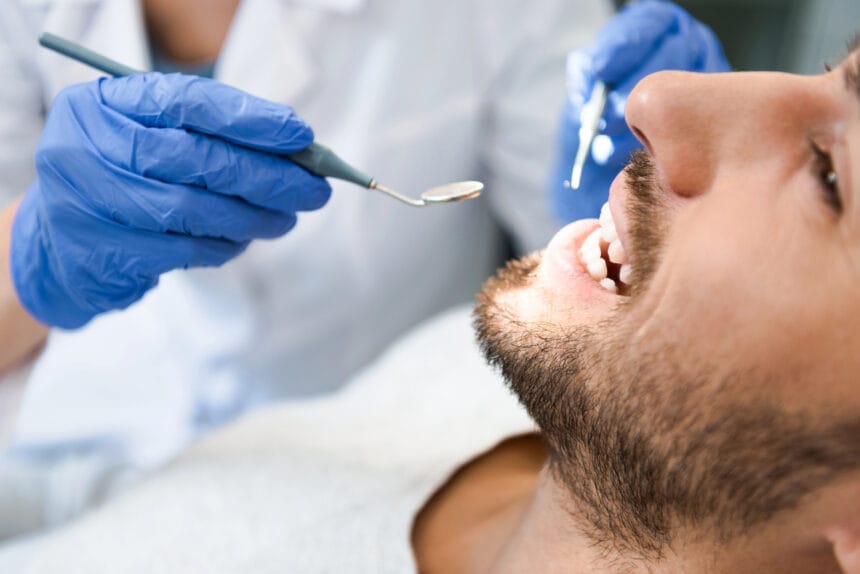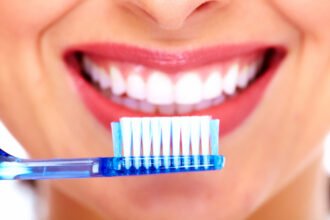Waking up with a sore jaw or dull headaches may not seem like a big deal at first. But these signs might point to a more serious issue involving night guards and TMJ.
Teeth grinding, also known as bruxism, usually happens while sleeping. Over time, it wears down enamel, damages fillings, and strains the muscles around your jaw. Left unchecked, it can also inflame the temporomandibular joints (also known as TMJ – the delicate hinges connecting your jaw to your skull).
Many people live with this discomfort for years without knowing the cause. The tension can travel, affecting the neck, shoulders, and even posture. Thankfully, there are real solutions. Proper intervention can help you sleep more soundly, preserve your teeth, and reduce tension that builds quietly each night.
The Signs of Nighttime Teeth Grinding
Clenching and grinding during sleep often go unnoticed. Most people learn about the problem from a partner who hears the sound at night or from a dentist spotting early wear. Beyond the obvious damage to teeth, the symptoms can be widespread.
You may wake up with a headache that fades after morning coffee. You might feel clicking or popping when you open and close your mouth. Sometimes the muscles along the side of your face ache for no clear reason.
What’s tricky is that these symptoms mimic other issues. TMJ-related pain can feel like earaches or tension headaches.
Stress often makes the condition worse. The nervous system holds onto tension, especially when there’s no outlet during waking hours. The result is an unconscious habit that wears your body down one night at a time.
Night Guards and TMJ – Why Early Attention Matters
It doesn’t take long for grinding to leave its mark. Even light clenching, repeated night after night, strains muscles and can lead to long-term discomfort. Jaw misalignment is another hidden risk.
If the bite shifts or teeth become uneven, simple tasks like chewing can turn uncomfortable. The joint itself may become inflamed, leading to limited motion or stiffness.
Even though this starts quietly, the impact grows. TMJ disorders can spiral if not taken care of early. The longer you wait, the more work it can take to restore balance.
That’s where TMJ treatments come in. Instead of just masking the pain, they attempt to reset the natural function of your jaw.
The Importance of Night Guards
A custom-fitted guard acts as a physical buffer between your upper and lower teeth. It keeps enamel from wearing down and absorbs some of the muscle pressure during clenching.
But this isn’t a one-size-fits-all solution. Over-the-counter guards often lack the fit and durability needed for lasting results. Professionally made night guards take into account how your teeth come together, your bite pattern, and any specific areas of pressure.
Some designs reposition the jaw slightly, allowing muscles to rest more naturally. These devices are made from medical-grade materials, offering a better fit and greater comfort throughout the night.
Using a guard doesn’t mean you’ll stop grinding overnight. But it gives your teeth and joints the chance to recover. Over time, with the help of other therapies, the habit often fades or reduces in intensity.
Exploring TMJ Treatments Beyond Night Guards
For some, a night guard offers distinct relief. But if the jaw joints are already inflamed, more support may be needed. TMJ treatments cover a number of techniques customized to how the condition presents in your body.
Physical therapy is often the first step. Specific exercises can retrain the jaw to move in smoother patterns. Stretching the muscles that control the jaw and neck helps loosen tension.
For those with joint inflammation, heat or cold therapy can reduce discomfort after daily activity.
Some cases involve deeper issues with bite alignment or chronic clenching caused by stress. In these situations, dental adjustments or behavioral therapies may help. A dentist may recommend reshaping certain teeth to distribute pressure more evenly.
Others benefit from mindfulness practices or counseling focused on reducing jaw tension triggered by anxiety.
Advanced cases may require imaging to look at the joint itself. In rare situations, injections or surgical options become part of the plan.
But for many, early treatment using physical therapy, counseling, and consistent use of a night guard brings noticeable relief.
Connecting With Local Help
Dealing with nighttime grinding and jaw tension is a challenge, but you don’t have to figure it out alone. Many local dental practices offer assessments that include a detailed look at your bite, jaw motion, and any signs of wear.
These clinics often work alongside physical therapists or sleep specialists when the problem spans multiple areas of health. By working with professionals who know how the jaw functions, you gain access to care that’s precise and personalized.
These providers don’t just look at the teeth. They assess how your muscles, posture, and habits might be affecting your jaw. That broad view often leads to better outcomes and more lasting comfort. Seeing a local practitioner also offers convenience. It means shorter wait times and follow-ups that fit your schedule. It also promotes a relationship where care can evolve as your condition changes.
Night grinding doesn’t stay static. It can improve, return, or shift depending on stress, lifestyle, and dental health.
Lifestyle Habits That Support Healing
Along with professional treatment, small changes at home can support your progress. Avoiding gum, hard foods, or biting on pens helps ease strain. Paying attention to your posture while using phones or computers can reduce jaw tension.
Stress management matters, too. Mindful breathing, regular sleep schedules, and even brief breaks during the day can reduce the buildup of unconscious tension. Some people benefit from massages focused on the jaw and neck. Others use warm compresses before bedtime to relax the muscles.
Tracking your symptoms in a journal can help spot triggers. (Think caffeine or late-night work.) These can lead to more grinding.
These simple strategies won’t replace a night guard or therapy, but they build a stronger foundation. When combined with dental support, they allow your body to rest more fully and recover over time.
Relief Starts with Awareness
Teeth grinding often hides behind common symptoms. A dull ache here. A sore jaw there. But when these signals repeat, they deserve attention. The combination of night guards and TMJ care offers a powerful response. It protects the teeth while giving the jaw space to heal.
However, it’s not just about fixing a dental issue. It’s about giving your entire system a break from chronic strain. Many people live with this pain because they don’t realize there’s a name for it, let alone a solution. But a custom treatment plan changes everything. It transforms broken sleep into rest, morning pain into ease, and jaw tension into comfort.
A Better Night Starts Now
You don’t have to wait for the pain to get worse. If you suspect you are grinding your teeth or notice signs of TMJ strain, talk to someone who can help.
From fitting a guard to exploring therapy options, personalized care makes a difference. Local experts can guide you toward practical steps that lead to lasting comfort. The secret is to start with one conversation, one exam, one step. Your jaw, your teeth, and your sleep are worth it.









